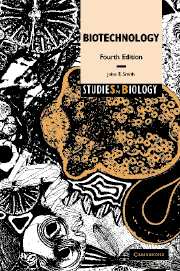Book contents
- Frontmatter
- Contents
- Preface
- 1 The nature of biotechnology
- 2 Substrates for biotechnology
- 3 Genetics and biotechnology
- 4 Bioprocess/fermentation technology
- 5 Enzyme technology
- 6 Biological fuel generation
- 7 Single cell protein (SCP)
- 8 Biotechnology and medicine
- 9 Environmental biotechnology
- 10 Biotechnology in the agricultural and forestry industries
- 11 Food and beverage biotechnology
- 12 Protection of biotechnological inventions
- 13 Safety in biotechnology
- 14 Public perception of biotechnology: genetic engineering – safety, social, moral and ethical considerations
- 15 Looking to the future
- Glossary
- Further reading
- Index
15 - Looking to the future
Published online by Cambridge University Press: 05 June 2012
- Frontmatter
- Contents
- Preface
- 1 The nature of biotechnology
- 2 Substrates for biotechnology
- 3 Genetics and biotechnology
- 4 Bioprocess/fermentation technology
- 5 Enzyme technology
- 6 Biological fuel generation
- 7 Single cell protein (SCP)
- 8 Biotechnology and medicine
- 9 Environmental biotechnology
- 10 Biotechnology in the agricultural and forestry industries
- 11 Food and beverage biotechnology
- 12 Protection of biotechnological inventions
- 13 Safety in biotechnology
- 14 Public perception of biotechnology: genetic engineering – safety, social, moral and ethical considerations
- 15 Looking to the future
- Glossary
- Further reading
- Index
Summary
Biotechnology has been shown to be a spectrum of enabling technologies which are increasingly being applied in many aspects of modern society. The applied use of biological systems, especially microorganisms, in such processes as brewing, wine making and cheese production was primarily accomplished in an empirical manner, with the management of these processes seen more as an art rather than a science. In recent times these ancient biotechnological processes have been subjected to rigorous scientific study and analysis, which has largely led to the replacement of traditional empiricism. Better understanding of microbial strain selection, molecular biology and genetics, together with improved bioprocess technology, have yielded major advances in all of the traditional biotechnology industries and will continue to achieve improved quality and safety together with cost-effectiveness.
A central feature of new biotechnological advances derives from an increasing understanding of the mechanisms of life and how these will eventually transform human lives as well as give a deeper appreciation of agriculture, aquaculture, forestry and the biological environment. The ability to select and manipulate genetic material within and outwith species has permitted unprecedented opportunities to alter life forms for the benefit of society. The successful sequencing of the human and other genomes is the beginning of a new scientific period of discovery. However, rather than genomic sequences being an end in themselves, it is but the beginning of scientific study to put the information into context with regard to the biological significance to the organism.
- Type
- Chapter
- Information
- Biotechnology , pp. 254 - 258Publisher: Cambridge University PressPrint publication year: 2004

